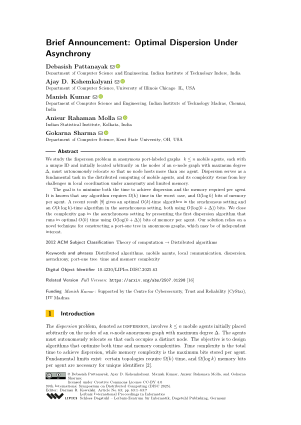Brief Announcement: Optimal Dispersion Under Asynchrony
Authors
Debasish Pattanayak  ,
Ajay D. Kshemkalyani
,
Ajay D. Kshemkalyani  ,
Manish Kumar
,
Manish Kumar  ,
Anisur Rahaman Molla
,
Anisur Rahaman Molla  ,
Gokarna Sharma
,
Gokarna Sharma 
-
Part of:
Volume:
39th International Symposium on Distributed Computing (DISC 2025)
Part of: Series: Leibniz International Proceedings in Informatics (LIPIcs)
Part of: Conference: International Symposium on Distributed Computing (DISC) - License:
 Creative Commons Attribution 4.0 International license
Creative Commons Attribution 4.0 International license
- Publication Date: 2025-10-22
File

PDF
LIPIcs.DISC.2025.63.pdf
- Filesize: 0.77 MB
- 7 pages
Document Identifiers
Related Versions
- Full Version https://arxiv.org/abs/2507.01298
Subject Classification
ACM Subject Classification
- Theory of computation → Distributed algorithms
Keywords
- Distributed algorithms
- mobile agents
- local communication
- dispersion
- asynchrony
- port-one tree
- time and memory complexity
Metrics
- Access Statistics
-
Total Accesses (updated on a weekly basis)
0PDF Downloads0Metadata Views
Abstract
We study the dispersion problem in anonymous port-labeled graphs: k ≤ n mobile agents, each with a unique ID and initially located arbitrarily on the nodes of an n-node graph with maximum degree Δ, must autonomously relocate so that no node hosts more than one agent. Dispersion serves as a fundamental task in the distributed computing of mobile agents, and its complexity stems from key challenges in local coordination under anonymity and limited memory. The goal is to minimize both the time to achieve dispersion and the memory required per agent. It is known that any algorithm requires Ω(k) time in the worst case, and Ω(log k) bits of memory per agent. A recent result [Kshemkalyani et al., 2025] gives an optimal O(k)-time algorithm in the synchronous setting and an O(k log k)-time algorithm in the asynchronous setting, both using O(log(k+Δ)) bits. We close the complexity gap in the asynchronous setting by presenting the first dispersion algorithm that runs in optimal O(k) time using O(log(k+Δ)) bits of memory per agent. Our solution relies on a novel technique for constructing a port-one tree in anonymous graphs, which may be of independent interest.
Cite As Get BibTex
Debasish Pattanayak, Ajay D. Kshemkalyani, Manish Kumar, Anisur Rahaman Molla, and Gokarna Sharma. Brief Announcement: Optimal Dispersion Under Asynchrony. In 39th International Symposium on Distributed Computing (DISC 2025). Leibniz International Proceedings in Informatics (LIPIcs), Volume 356, pp. 63:1-63:7, Schloss Dagstuhl – Leibniz-Zentrum für Informatik (2025)
https://doi.org/10.4230/LIPIcs.DISC.2025.63
BibTex
@InProceedings{pattanayak_et_al:LIPIcs.DISC.2025.63,
author = {Pattanayak, Debasish and Kshemkalyani, Ajay D. and Kumar, Manish and Molla, Anisur Rahaman and Sharma, Gokarna},
title = {{Brief Announcement: Optimal Dispersion Under Asynchrony}},
booktitle = {39th International Symposium on Distributed Computing (DISC 2025)},
pages = {63:1--63:7},
series = {Leibniz International Proceedings in Informatics (LIPIcs)},
ISBN = {978-3-95977-402-4},
ISSN = {1868-8969},
year = {2025},
volume = {356},
editor = {Kowalski, Dariusz R.},
publisher = {Schloss Dagstuhl -- Leibniz-Zentrum f{\"u}r Informatik},
address = {Dagstuhl, Germany},
URL = {https://drops.dagstuhl.de/entities/document/10.4230/LIPIcs.DISC.2025.63},
URN = {urn:nbn:de:0030-drops-248795},
doi = {10.4230/LIPIcs.DISC.2025.63},
annote = {Keywords: Distributed algorithms, mobile agents, local communication, dispersion, asynchrony, port-one tree, time and memory complexity}
}
Author Details
- Department of Computer Science and Engineering, Indian Institute of Technology Indore, India
- Department of Computer Science and Engineering, Indian Institute of Technology Madras, Chennai, India
Funding
- Kumar, Manish: Supported by the Centre for Cybersecurity, Trust and Reliability (CyStar), IIT Madras.
References
- Ankush Agarwalla, John Augustine, William K Moses Jr, Sankar K Madhav, and Arvind Krishna Sridhar. Deterministic dispersion of mobile robots in dynamic rings. In ICDCN, pages 1-4, 2018. URL: https://doi.org/10.1145/3154273.3154294.
- John Augustine and William K. Moses Jr. Dispersion of mobile robots: A study of memory-time trade-offs. In ICDCN, pages 1:1-1:10, 2018. URL: https://doi.org/10.1145/3154273.3154293.
- Rik Banerjee, Manish Kumar, and Anisur Rahaman Molla. Optimizing robot dispersion on unoriented grids: With and without fault tolerance. In ALGOWIN, pages 31-45, 2024. URL: https://doi.org/10.1007/978-3-031-74580-5_3.
- Rik Banerjee, Manish Kumar, and Anisur Rahaman Molla. Optimal fault-tolerant dispersion on oriented grids. In ICDCN, pages 254-258, 2025. URL: https://doi.org/10.1145/3700838.3700842.
- Prabhat Kumar Chand, Manish Kumar, Anisur Rahaman Molla, and Sumathi Sivasubramaniam. Fault-tolerant dispersion of mobile robots. In CALDAM, pages 28-40, 2023. URL: https://doi.org/10.1007/978-3-031-25211-2_3.
- Giuseppe F. Italiano, Debasish Pattanayak, and Gokarna Sharma. Dispersion of mobile robots on directed anonymous graphs. In SIROCCO, pages 191-211, 2022. URL: https://doi.org/10.1007/978-3-031-09993-9_11.
- Ajay D. Kshemkalyani. Dispersion of mobile robots on graphs in the asynchronous model. Theor. Comput. Sci., 1044:115272, 2025. URL: https://doi.org/10.1016/j.tcs.2025.115272.
- Ajay D. Kshemkalyani and Faizan Ali. Efficient dispersion of mobile robots on graphs. In ICDCN, pages 218-227, 2019. URL: https://doi.org/10.1145/3288599.3288610.
- Ajay D Kshemkalyani, Manish Kumar, Anisur Rahaman Molla, Debasish Pattanayak, and Gokarna Sharma. Dispersion is (almost) optimal under (a) synchrony. In SPAA, 2025. URL: https://doi.org/10.1145/3694906.3743317.
- Ajay D. Kshemkalyani, Anisur Rahaman Molla, and Gokarna Sharma. Fast dispersion of mobile robots on arbitrary graphs. In ALGOSENSORS, pages 23-40, 2019. URL: https://doi.org/10.1007/978-3-030-34405-4_2.
- Ajay D. Kshemkalyani, Anisur Rahaman Molla, and Gokarna Sharma. Dispersion of mobile robots on grids. In WALCOM, pages 183-197, 2020. URL: https://doi.org/10.1007/978-3-030-39881-1_16.
- Ajay D. Kshemkalyani, Anisur Rahaman Molla, and Gokarna Sharma. Dispersion of mobile robots using global communication. J. Parallel Distributed Comput., 161:100-117, 2022. URL: https://doi.org/10.1016/j.jpdc.2021.11.007.
- Ajay D. Kshemkalyani and Gokarna Sharma. Near-optimal dispersion on arbitrary anonymous graphs. Journal of Computer and System Sciences, 152:103656, 2025. URL: https://doi.org/10.1016/j.jcss.2025.103656.
- Anisur Rahaman Molla, Kaushik Mondal, and William K. Moses Jr. Byzantine dispersion on graphs. In IPDPS, pages 942-951, 2021. URL: https://doi.org/10.1109/IPDPS49936.2021.00103.
- Anisur Rahaman Molla, Kaushik Mondal, and William K. Moses Jr. Optimal dispersion on an anonymous ring in the presence of weak byzantine robots. Theor. Comput. Sci., 887:111-121, 2021. URL: https://doi.org/10.1016/j.tcs.2021.07.008.
- Debasish Pattanayak, Ajay D. Kshemkalyani, Manish Kumar, Anisur Rahaman Molla, and Gokarna Sharma. Optimal dispersion under asynchrony. CoRR, abs/2507.01298, 2025. URL: https://doi.org/10.48550/arXiv.2507.01298.
- Debasish Pattanayak, Gokarna Sharma, and Partha Sarathi Mandal. Dispersion of mobile robots in spite of faults. In SSS, pages 414-429, 2023. URL: https://doi.org/10.1007/978-3-031-44274-2_31.
- Yuichi Sudo, Masahiro Shibata, Junya Nakamura, Yonghwan Kim, and Toshimitsu Masuzawa. Near-linear time dispersion of mobile agents. In DISC, pages 38:1-38:22, 2024. URL: https://doi.org/10.4230/LIPIcs.DISC.2024.38.
